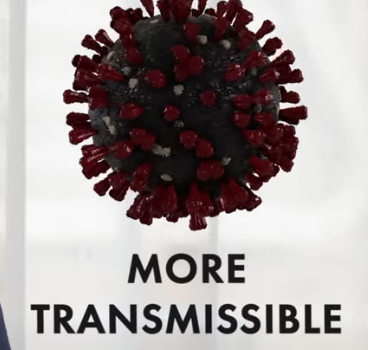Fourth Wave of Corona virus | Delta Plus Variant in Pakistan | Sohail Saleem
Hello, friends!
Talking about Coronavirus, there is an uproar in the world because of the Delta variant. America and European countries are worried that the Delta variant will cause the next wave of Covid. On the other hand, people in Pakistan are worried that there might be a fourth wave because of the Delta Plus variant. What is this Delta Plus variant? And when can this third wave happen? Come, let's try to find out in today's articleFriends, what's special about the mutations is that
it happens in every living being. Whether it's a human, animal, plant, tree, or even a virus.
Mutations accompany reproduction. A person's DNA, when you have children, and the DNA is transferred,
then from one generation to the next, on average there are 100-200 mutations in the DNA. Most of the mutations are harmless, can't be seen, and neither can their effects be felt. Same with viruses. Thousands of mutations take place in the Covid virus. Most of them do not bother us. But at times there are such mutations that make the virus more transmissible.
 |
| Fourth Wave of Corona virus | Delta Plus Variant in Pakistan | Sohail Saleem |
So that the virus can spread easier. And at times there are such mutations that make the virus more deadly. WHO or the World Health Organization keeps a track of the dangerous mutations of Coronavirus. WHO has classified these mutations into two categories. The first category is 'Variants of Interest'. And the second category is 'Variants of Concern'. Broadly speaking, Variants of Interest will include those coronavirus variants that have been detected in multiple countries. And which have high transmissibility. Meaning that they spread easily.
As compared to the original virus. On the other hand, the variants of concern include those coronavirus variants
that has not only high transmissibility not only do they spread more easily,
but the disease caused by them is much more severe. And the effectiveness of the vaccines on these variants is lesser than compared to the original virus. Currently, WHO has put four variants in the Variant of Concern category. Alpha, Beta, Gamma, and Delta. The Alpha variant was called the UK variant initially. Because it was first found in the UK. Similarly, the Beta variant was found in South
Africa.
Gamma in Brazil. And the Delta variant was first discovered in India.
That's why it was also called the Indian variant initially.
Later, people protested as to why they were named after countries.
When the original virus came from China,
we did not name it the Wuhan virus or the China virus.
So why are the names of the variants based on the countries they're found in? So WHO reacted to this.
And then WHO decided to rename them to Alpha, Beta, Gamma, and Delta. The strain of the Delta variant was first found in October 2020 in India. This was the cause of the second wave in India.
Today, the Delta variant has spread to over 80 countries.
Its transmissibility is extremely high. Meaning it spreads easily.
Before moving forward, I should clarify one thing. Discovering a variant in a country is merely a matter of chance. No country can be blamed for anything. Because as I said, the virus is going through thousands of mutations. Which mutation will turn out to be more dangerous or more transmissible is all up to chance. Including where the mutation will be found. In extremely mathematical terms, studies have shown that the Delta variant is 60% more transmissible than the Alpha variant.
And the Alpha variant was 50% more transmissible than the original strain found in Wuhan in 2019. So you can imagine how much more infectious it is than the original. Generally, when viruses mutate and become more transmissible,Another interesting thing to know is that the symptoms of the Delta variant are a little different than the original Covid-19 symptoms.
Originally, a runny nose was not made out to be one of the major symptoms. But recently, a study has been conducted in the UK
when people self-reported their symptoms. It was found that among the symptoms of the Delta variant, the runny nose features prominently in the list of symptoms. Headache, runny nose, cold, sore throat, were the top symptoms. So the symptoms of the Delta variant are very similar to the symptoms of the common cold. Loss of smell. Not being able to smell things properly. Was a major symptom in the original strain of Covid-19.
But for the Delta variant, ranked 9th in the UK study. The good news regarding the vaccines is that according to the data available till now, almost all the vaccines are definitely effective against the Delta variant.
Pfizer vaccine, AstraZeneca's Covishield vaccine, and others have shown that they are more than 90% effective in preventing hospitalization and death. If you catch the Delta Variant after taking both doses.
The only trouble here, though marginal, is that the effectiveness of the vaccines in preventing symptoms has reduced. Like AstraZeneca's Covishield's effectivity in preventing symptoms against the Delta variant
remains at only 60% after taking both doses.
Though Pfizer's vaccine is still showing effectiveness of 88% in it too.
At an individual level,
there is only one sure-shot, long-term solution of being protected from the fourth wave. And that is to get vaccinated as soon as you get the chance to.
Today I got my vaccine.
Because it's possible that the Delta Plus variant does not cause the third wave. But remember, there are thousands of mutations in this virus every day. Someday, a mutation may crop up, that is more transmissible and more deadly and can bring forth the third wave. That's why the vaccine is the best chance we have to be safe from it.















0 Comments
Hello Bro